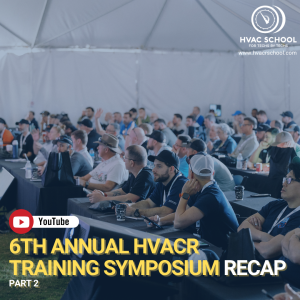BACK
 Michael Faraday: Patron Saint of HVAC Technicians
Michael Faraday: Patron Saint of HVAC Technicians
 Blower Fan Watt Draw Considerations for ECMs
Blower Fan Watt Draw Considerations for ECMs
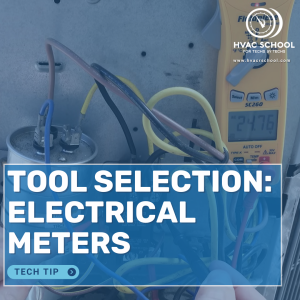 Tool Selection: Electrical Meters
Tool Selection: Electrical Meters
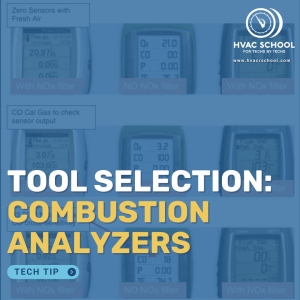 Tool Selection: Combustion Analyzers
Tool Selection: Combustion Analyzers
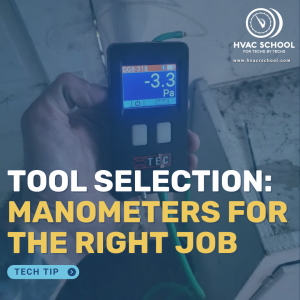 Tool Selection: Manometers for the Right Job
Tool Selection: Manometers for the Right Job
 Condenser Fan Blade Placement
Condenser Fan Blade Placement
 Tool Selection: Analog vs. Digital vs. Probes
Tool Selection: Analog vs. Digital vs. Probes
 Two Ways to Prevent Freezing in 90%+ Furnace Condensate Lines
Two Ways to Prevent Freezing in 90%+ Furnace Condensate Lines
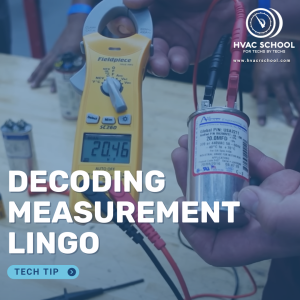 Decoding Measurement Lingo
Decoding Measurement Lingo
 How to Deal w/ Too Much – Short #240
How to Deal w/ Too Much – Short #240
 Delta T Talk w/ JD Kelly
Delta T Talk w/ JD Kelly
 Fire Sprinklers – Short #239
Fire Sprinklers – Short #239
 The PATH to High Performance HVAC w/ David Richardson
The PATH to High Performance HVAC w/ David Richardson
 Nylog, Oil? Where does it go? – Short #238
Nylog, Oil? Where does it go? – Short #238
 Growing your HVAC Business the Smart Way w/ Copeland
Growing your HVAC Business the Smart Way w/ Copeland
 Oversized Evap Coils? – Short #237
Oversized Evap Coils? – Short #237
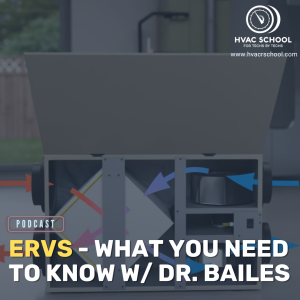 ERVs – What You Need To Know w/ Dr. Bailes
ERVs – What You Need To Know w/ Dr. Bailes
 Multiple Surge Protectors – Short #236
Multiple Surge Protectors – Short #236
#hvac
Tech Tips:

Who was Michael Faraday—besides the guy we named the capacitor after? Well, actually, we named the measure of capacitance after him (the farad), but let’s not get all caught up in semantics. Faraday was a scientist who lived from 1791 to 1867. He was an experimental scientist who had little to no formal education but […]
Read more

I'd like to give special thanks to Steve Rogers from TEC for helping write this tech tip about ECM blower fan watt draw and sharing some helpful visuals. Thanks, Steve! ACCA Standard 310 introduced a grading protocol for HVAC systems. While HVAC practitioners won’t be the ones carrying out the tasks laid out in Standard […]
Read more

I'd like to give a special thanks to Tony Gonzalez from Fieldpiece for providing technical guidance about the SC680's power measurement capabilities, as well as VAC and AAC measurements on ECMs. You can learn more about the SC680 and other electrical meters on Fieldpiece's website. We’ve talked through specifications, applications, and features for a few […]
Read more

While gauge manifolds and manometers may only have one main function, some tools take several different measurements and will have more expansive specs. The combustion analyzer is one such example—combustion has so many elements, and we need something that can analyze the concentrations of several different substances as well as temperature. As such, a combustion […]
Read more

Last week, we briefly looked at the spec sheet of a gauge manifold. All things considered, it was quite short; we only had to worry about the refrigerant types, pressure ranges, and hose diameters. However, manometers’ spec sheets are quite a bit longer than gauge manifolds’ because they have resolution and accuracy specs, among other […]
Read more

In a previous article, I talked about wiring permanent split capacitor (PSC) condenser fan motors. While researching the topic, I realized that there isn’t as much information available on condenser motors as there is on their counterpart—the indoor blower motor. I had never really given it much thought, as I assumed that the condenser motor […]
Read more

The original tools of the trade were all analog: electrical meters, gauges, and even manometers (Magnehelic, anyone?). However, digital tools have also become a staple of the skilled trades—where would most of us be without digital multimeters? And then probes also joined the fray with the rapid improvements to smartphone technology over the last 15–20 […]
Read more

This tech tip came from an email sent by Adam Blunkall, a Tennessee-based HVAC technician. He shared some tips to help prevent the issue of freezing in 90%+ furnaces in his market, and we appreciate his insight. Thanks, Adam! If we’re draining our 90%+ furnaces (or any condensing heating system) outside the structure in a […]
Read more

Troubleshooting and commissioning are entirely data-dependent processes. How can you know that a system is undercharged unless you measure the superheat and subcooling? How can you know how much static pressure a blower motor has to overcome? In both cases, we use tools and measurements to help us determine the next steps. However, using the […]
Read more
Videos:
Podcasts:

In this short podcast, Bryan talks about how to deal with too much at work and in life. He gives some practical tips to help you when you feel overwhelmed. One of the best ways to get ahead is to wake up early, exercise, get sunlight, stay hydrated, eat healthy, and get enough sleep. […]
Read more

Bryan from HVAC School interviews JD Kelly, known as “student of HVAC” on Instagram, about Delta T measurements in HVAC systems. This episode dives into the fundamentals of Delta T, common misconceptions, and proper measurement techniques. JD explains that Delta T is simply a temperature difference between two points of the same medium, which […]
Read more

In this short podcast episode, Bryan talks about fire sprinklers and how to avoid setting them off on job sites. Fire sprinklers have an element in the center that expands when exposed to heat (like a TXV sensing bulb) and breaks the glass. When the glass breaks, the fire sprinkler starts pouring out water. […]
Read more

In this engaging session, David Richardson breaks down the concept of high-performance HVAC, offering a clear roadmap for industry professionals looking to elevate their craft. Richardson argues that the HVAC industry has long been focused on equipment rather than complete systems, leading to widespread inefficiencies. The average system delivers only about 57% of its […]
Read more

In this short podcast, Bryan answers a listener-submitted question about Nylog, oil, and where you put them when you're making flares. Nylog is a thickened refrigerant oil (which is either POE for Nylog Blue or mineral oil for Nylog Red), and it's miscible with the refrigerant and moves with it through the circuit. You […]
Read more

In this episode of the HVAC School podcast, Bryan and Jim discuss strategies for growing an HVAC business, focusing on the importance of maintenance contracts, consistent service, and effective branding. Drawing from Jim's 15 years of experience running a successful HVAC company in California, they explore how maintenance contracts not only provide consistent revenue […]
Read more

In this short podcast episode, Bryan answers a listener-submitted question about oversized evaporator coils, particularly when they're half a ton or a full ton larger than the condenser. The expanded performance data contains the information that'll tell you whether the coil is right for the system. However, when it comes to the specific issue […]
Read more

In this episode of the HVAC School podcast, host Bryan sits down with building science expert Allison Bailes to dive deep into the world of Energy Recovery Ventilators (ERVs). The conversation explores the critical role of ventilation in modern homes, highlighting how ERVs have become an essential component of maintaining indoor air quality and […]
Read more

In this short podcast episode, Bryan answers a listener-submitted question asking whether you can use another surge protector at the disconnect panel with an ICM 493 already in place. Using multiple surge protectors in the configuration described does NOT count as daisy-chaining. Surge protectors with MOVs (metal oxide varistors) shunt current from high voltage […]
Read more




